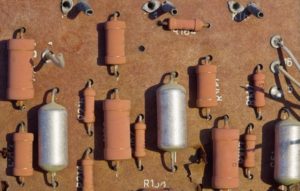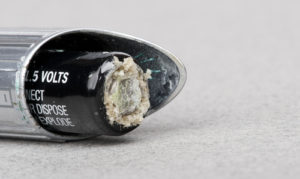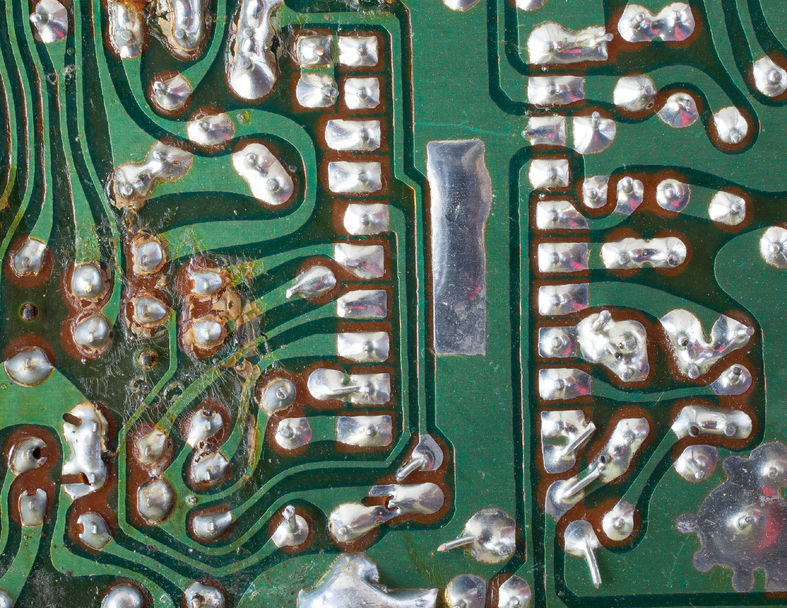First, what is corrosion? Corrosion is a natural process where unstable materials (such as metals) are gradually destroyed (and thus made more stable) by chemical reaction. The most common of which is rusting, where iron and iron alloys are broken down by exposure to mixture of oxygen and moisture.
In the service center we are frequently questioned about corrosion as a failure mode. When this topic comes up, the scenario that is most often presented is also the most unlikely, where a component is thought to be sprayed down, dunked or other-wise submerged in a liquid. Usually when we see corrosion cause a device to fail, it is mostly often gradual and unexpected. The following are the most common we see.
TEMPERATURE CHANGES
- Rapid temperature changes can cause condensation within an electrical enclosure leading to an eventual corrosion related failure. Condensation happens when warm, moist air is suddenly exposed to surfaces that are cooler than the dew point of the surrounding air. This will then lead to component metals (the most common in printed circuit boards being copper, lead and tin) gradually corroding. How do you avoid this? While there are of
 course many products on the market designed to insulate and protect your electronics, perhaps the most practical solution (and most affordable) is to simply control the environment. Set temperatures in your facility to stay as close to room temperature as possible. The closer to 68 to 70 degrees you keep things the better.
course many products on the market designed to insulate and protect your electronics, perhaps the most practical solution (and most affordable) is to simply control the environment. Set temperatures in your facility to stay as close to room temperature as possible. The closer to 68 to 70 degrees you keep things the better.
CHEMICAL PROCESSES
- Some manufacturing processes involve chemicals which may speed up the process of corrosion. One of the most rapid is when a piece of electronics is exposed to an acid. The most common being Sulfuric (used in the oil refining process), Nitric (commonly used in fertilizers) or Citric (used as a very common food preservative). This is a bit trickier to avoid because it is very application dependent. Discuss with your employees and have a written plan in place for controlling processes involving caustic chemicals. Make sure your employees are following proper procedures for the dispensing and use of these substances around your machinery.
BATTERIES
- Batteries are ubiquitous in electronics. They provide power to mobile devices, they provide back-up power for memory components, and serve as an uninterruptable power supply to systems in case of unexpected sudden power loss. But one of the unfortunate properties of batteries in general is that they all have a shelf life and are all susceptible to corrosion.Why do batteries corrode? It is due to the fact that all batteries gradually discharge (uninstalled batteries slowly, while installed batteries more rapidly). Once most of the current is drained from the cell, a reaction occurs where the chemicals inside the battery, most often potassium hydroxide,
 leaks from the metal housing causing corrosion damage to surrounding circuits. This is perhaps the easiest, but most often overlooked of corrosion related but preventable failures. Keeping track of the shelf life of any batteries that are in use in your applications is key to preventing a corrosion related problem. Train your employees to open any housings containing batteries and look for a signature “White fluff” that is building up around the battery terminal it is most often toward the cathode, or negative end. Immediately replace any batteries with any signs of corrosion (using manufacturer’s recommended procedures of course).
leaks from the metal housing causing corrosion damage to surrounding circuits. This is perhaps the easiest, but most often overlooked of corrosion related but preventable failures. Keeping track of the shelf life of any batteries that are in use in your applications is key to preventing a corrosion related problem. Train your employees to open any housings containing batteries and look for a signature “White fluff” that is building up around the battery terminal it is most often toward the cathode, or negative end. Immediately replace any batteries with any signs of corrosion (using manufacturer’s recommended procedures of course).
Hopefully using the knowledge presented above can help you prevent a corrosion related failure in your facility, but if not, we are here 24 hours a day for all of your electronic repair needs. Be sure to visit www.gesrepair.com or call us at 1-877-249-1701 to learn more about our services. We’re proud to offer Surplus, Complete Repair and Maintenance on all types of Industrial Electronics, Servo Motors, AC and DC Motors, Hydraulics and Pneumatics. Please subscribe to our YouTube page and Like Us on Facebook! Thank you!

The military used to use wax I think beeswax and I worked for Siemens for 14 years and they had some parts coated in wax.